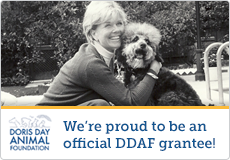| Detroit Free Press (MI)
June 15, 2000
LEASH ON LIFE PONTIAC GROUP HELPS NEGLECTED PETS, SAYS
CITY CAN PROFIT FROM LICENSE LAWS
Author: KIM NORTH SHINE FREE PRESS STAFF WRITER
It looked bad from the street as the volunteers pulled
up in their white panel truck Saturday to check on a
mother dog and six puppies born a week earlier on a pile
of dirt and feces in a Pontiac backyard.
The beagles’ faces were pressed against the grate of a
homemade 2-by-3-foot crate, struggling for air. There
was no water and no food. The runt was covered in flies.
“We think they were left there to die. All we could do
was throw in a little water,” said Marie Skladd,
president of the Animal Care Network, which made 20
stops Saturday to help neglected pets in Pontiac.
The nonprofit group of volunteers has visited forgotten
animals in backyards nearly every Saturday for 10 years,
going out in three teams of four volunteers, mostly in
Pontiac and Inkster. Now they want the city to start
working with them to help more animals and the people
who can’t afford to care for their pets.
In their time tooling the streets, the volunteers have
documented the number of animals needing vaccinations
and sterilizations, and the ones that received them for
free from veterinarians and through donations. They’ve
left behind thousands of fresh meals and bowls of water,
dog houses, leashes, collars and treats on their visits.
They’ve recorded the number of abused, dead, starving
and wild dogs that run in packs.
They also estimate 13,300 dogs are unlicensed, Skladd
said.
It’s in the number of animals that don’t have licenses
that they hope city officials will see a reason to work
with them, much like the City of Taylor has with the
Taylor Animal Group.
At tonight’s Pontiac City Council meeting, the
volunteers and some Pontiac residents plan to propose a
partnership they say could bring more money into city
coffers and potentially end the suffering of some
animals.
“You either are or you aren’t an animal lover. But that
doesn’t matter. We’re going to focus on the facts and
figures,” Skladd said.
By her count — 40 animals visited per street each week
multiplied by the number of residential streets —
Pontiac is losing at least $200,000 in revenue this year
on dogs that aren’t licensed. A license costs $15 per
year. With state health officials warning of a rise in
rabies in animals, there’s more reason to make sure dogs
are licensed, Skladd said.
By law, animals must be licensed and they must be
provided with food and shelter, but the volunteers say
that the Pontiac Animal Control can’t get to all the
households reported to them.
“If we don’t do it, a lot of times the poor animal dies.
And nothing ever happens,” Skladd said.
Calls to Animal Control Director Tom Farrell were
referred to Steve Manning, director of building and
safety. He was on vacation. Pontiac Mayor Walter Moore
did not respond to requests for comment.
If the licensing laws were enforced, the money collected
could be used to hire another animal control officer,
and pay for vaccination and spay and neuter clinics,
Skladd said. Pontiac currently has one full-time animal
control officer. Volunteers could find the people who
need the service the most and look for homes for
unwanted pets instead of having them destroyed, she
said. |




